It is our pleasure to welcome Katherine MacLean, PhD, author of Midnight Water: A Psychedelic Memoir, as our featured author for October. Katherine is a neuroscientist with expertise in studying the effects of mindfulness and psychedelics on the brain. As a research fellow and faculty member at Johns Hopkins University School of Medicine, she conducted groundbreaking research on psilocybin and personality change that led the way in how psychedelic medicines can promote mental health and well-being.
Katherine left her faculty job following the death of her younger sister from cancer. Her book documents how this tragedy set her on an unexpected path towards future healing of her traumatic past, the loss of her sister and the immense grief these inflicted on her. In her article here, Katherine gives a beautiful insight into the twists and turns her journey of psychedelic healing took into the centre of her being.
Interact with Katerine on our AoM forum here.
Have you ever experienced your own mind or body to be like a maze that is impossible to escape? Or maybe you would call it an elaborate trap? I have heard that there are many allegedly happy people out there who don’t experience this, who have never thought to try therapy, or meditation, or any drug other than our culture’s favorite pastime (alcohol). But for me, starting in my late teens, I started to try to flee my body and mind in every way I could. These exit strategies never crossed the boundary of real, intentional harm to myself (thank goodness), which is not to say that I didn’t almost die several times by accident. Such is the territory of desperate humans who feel trapped in their own skin. We will try anything.
Thankfully, more than two decades later, I am no longer trying to flee. I feel at home in my body and have befriended my mind (yes, even the dark places and the demons lurking about the shadows). I know that it is possible to traverse the dangerous terrains between hate and love (toward yourself, and toward others), and that it is a miracle when you arrive on the other side. Luckily, there is a kind of method to the miracle, which is why I wrote Midnight Water: A Psychedelic Memoir. This book is my map out of the labyrinth.
The story of the labyrinth goes something like this. A rich old man (who happened to be king) got angry when his beautiful wife (the queen) cheated on him with a very muscular and impressive bull, and in a state of absolute shame and rage, the king hid the evidence (the half-human, half-animal child that resulted from the queen’s love affair) in a fancy, complicated, spooky maze designed by his favorite paid scientist. Once a year, the king would send a few people into the maze to be eaten alive by the monster at the center, just to make sure everyone remembered to be very afraid of whatever was in there. No one ever came out (including the monster), so the king’s shameful secret was safe in the maze. This went on for some time until the king’s daughter (also the monster’s half-sister) decided enough was enough with all the human sacrifice and found a hero to send into the maze to defeat the monster. The daughter convinced the scientist who designed the maze to reveal the method for getting to the center, which she then told the hero, who went in and killed the monster. The key to the story is that the daughter also gave the hero a thread to bring into the maze, so that he could safely trace his way back out again.
I’ve always thought that this ancient story about a maze, or labyrinth, is still a perfect allegory for the most serious psychological challenges many of us face growing up in our modern world. It speaks to the power of parental authority (specifically, the patriarchy), domestic abuse (almost always directed toward women and children), and the ways in which anything that challenges that authority will be punished, shamed, hidden away, erased and killed. I like to think of the King’s daughter as a compassionate therapist who is trying her best to safely address buried family trauma. And if the original story was written by a woman, maybe there would be a different ending. The daughter doesn’t hire a hero, she goes in herself. She doesn’t kill the monster, but befriends it.
Midnight Water is a modern, psychedelic take on the labyrinth tale, told by a woman (me) who is not only the king’s daughter, but the scientist, the hero, and the monster, too. Through many false turns and ominous dead ends, we witness the woman as she methodically investigates every single corridor and undoes the maze from within. By the end of the story, we can celebrate our heroine’s triumph, which is quite a bit more impressive than our hero from the past: she has made it to the center of the terrifying and disorienting maze, befriended and released the monster, and even made amends with the scientist (her past self) who constructed the maze and the king who is the very reason for the maze in the first place.
Of course, the reality is that none of us are only one of these roles. Anyone can find themselves in the role of the villain (the king), the person who made a terrible mistake that caused a lot of harm (the queen), the traumatized, silenced child (the monster), and the savior (the hero or king’s daughter). Oftentimes, we are several of these roles at once and they are actively battling each other within our own psyche. I have come to understand the labyrinth as the complex psychological-cognitive-emotional-somatic fortress that we have constructed to protect ourselves from fully facing our worst fears, secrets and painful memories; it is also the psychological armor that keeps our family, friends and community from knowing who we really are and what happened to us. Over time, we come to believe that the labyrinth is necessary, and we may even forget the original purpose of the structure or what we placed at the center. Midnight Water is my honest and sincere attempt to demonstrate that it is possible to successfully navigate the labyrinth, discover the identity or truth of our own monster, and finally, accept both the monster and the king, without having to destroy either.
Midnight Water is bookended by two deaths: the death of my younger sister from breast cancer (Chapter 1: One Missing) and the death of my father from lung cancer which metastasized to his brain (Chapter 10: Hakuna Matata Tea). What transpires in the space between these deaths is a complex weaving of the immensity of grief, the suffocating silence around childhood trauma, the joy of creation, and the liberation of forgiveness. The story is fueled by psychedelic substances, which take on the energy, personality, and importance equal to the human characters of the story. Without telling the reader how to take psychedelics, I show the reader my methods, including my mistakes.
The full arc of Midnight Water is itself like a drug, and reading (or better yet, listening to) it will almost unavoidably alter your consciousness. Below, I have chosen an excerpt from Chapter 2: Mushroom Night in Freedom to give you a taste of what this new substance might be like. Consider this your informed consent.
Excerpt from Midnight Water: A Psychedelic Memoir – Chapter 2: Mushroom Night in Freedom
Mushrooms, like Sarah in Nepal, had walked with me through many a dark night. I wouldn’t say they were the most reliable companions, but at least they told me the truth and made me laugh. But they could also be such assholes! They were the kind of friends who would trick you into walking into a cemetery at night only to hide behind a gravestone and jump out and yell, “Boo!” But they were surprising you with your worst memories. Like, “Hey! Look at this one! Did you remember THAT?
Maybe that’s why you hate your dad and are so mad at your boss.” They didn’t understand that friendship was supposed to be fun, or maybe their version of fun was just different. So instead of asking you to take a walk in the graveyard—which you have to know is a pretty spooky idea—they invite you to a party instead. You think it’s gonna be fun, although your stomach is turned in knots and you say to yourself, “I’m just gonna have one drink and then leave.” But before you can slip out the back door, everyone jumps out from behind the sofa and screams your worst trauma at you and throws confetti at the same time. The mushrooms think they’re helping. They think this is fun. They have such a fucked up sense of humor.
People often ask me how mushrooms work, or if they can work for them. After all these years, I can say that I honestly don’t know. It’s always a bit of a crap shoot. But I can also say that the true magic of mushrooms is that you are creating an opening, an invitation, for dialogue with a complex intelligence that is totally alien and totally Earthly at the same time. I don’t believe it’s possible to fix individuals with this medicine, despite what psychedelic psychotherapists claim. I have come to learn that mushrooms work at the level of connections and relationships—in the spaces between. They will do their work of weaving and connecting even where you don’t wish them to. They will shine a light on all the dark corners, not just the ones you picked. Sometimes, you’ll get better; other times, you’ll get worse. You will definitely learn and see things that you wish you hadn’t. In this way, it’s a lot like the path to enlightenment. You don’t start down that road because you want to feel better about yourself. Or, as one of my favorite tortured authors, David Foster Wallace, once put it, “The Truth will set you free, but not until it is finished with you.”
…
I didn’t know very much about Patrick when I invited him to Freedom, but I knew from our short interaction during dinner that, like Sarah, he was not afraid of death, or me. He had a real gravitas about him when he spoke about his ceremonial work. I didn’t really understand what he meant when he talked about “the mushroom altar,” but I somehow knew that this experience had been waiting for me for fifteen long years since I had first dabbled with mushrooms by the side of a friend’s pool one warm summer night.
Patrick was very quiet during the hour or so before the ceremony began. Earlier, he had led us through an “intention-setting” exercise that neither Sarah nor I completely understood. I had lofty spiritual goals, which Patrick gently steered me away from. He said, “Your intention should be simple.” The idea was to reduce your aspirations and goals into a single, short phrase that you could repeat to yourself during the experience to keep your mind on track. What came out of the exercise was the mantra I would use during the ceremony, like the girl had used in Spirited Away. This would be the thread I dragged behind me as I entered the labyrinth to meet the Minotaur, and it would ideally get me out again in one piece. I had never used this approach before, which, looking back, maybe explains why my mushroom experiences were so all over the place and often quite bad. No, please, don’t just drag me around the room introducing me to every single person you invited to your spooky party. I’m here to see the little girl.
I had encountered this little girl only once before, during a “soul retrieval” exercise guided by a witchy hermit. In the vision, a dry, scaly, slithering rattlesnake led me into a desert cave somewhere in the American southwest, and hiding there, all curled up, was this small child, maybe three years old. She had clearly been abandoned, or maybe she intentionally ran away, but she was all alone and wanted nothing to do with me. The woman who fell in the river in Nepal had also mentioned soul retrieval when she described the process of her psychological healing after returning to the States. She had no memories from the accident, including the life-saving measures she had received on the riverbank or the helicopter ride to Kathmandu. She just remembered being on the trail one minute, and then waking up in the hospital the next. How do you go about healing a trauma you don’t even remember?
Well, I learned that adult traumatic brain injury isn’t so much different than very early childhood trauma. We were there when it happened, but it never got clearly encoded as a memory. Our minds don’t remember, but our bodies do. So, what some modern psychologists call trauma therapy, witches and shamans call soul retrieval. In both cases, you are engaged in the process of re-collecting the parts of yourself that have been broken off and scattered as a result of life events that involved too much pain or fear to fully bear at the time. Perhaps, this mushroom ceremony was my chance to finally re-collect myself, in contrast to my historic practice of blowing up and scattering every part of myself all over the Universe.
…
To begin, Patrick ritually cleansed us with burning sage, moving and wafting the smoky, pungent material about six inches from our skin, even under the soles of our feet. He also used an eagle feather to ritually brush off any remaining impurities along our arms, legs, head and back. Then we sat down, and he used the sage to cleanse the bag of mushrooms. He started counting and creating little piles of mushrooms on the piece of fabric, one in front of me and one in front of Sarah. He would reach into the plastic baggie and withdraw a single, small, dried up little greybrown mushroom, hold it in his hand, and then delicately place it in one of the piles. I had read enough about the traditional Mazatec mushroom ceremony to know that the mushrooms are believed to be divine oracles and can speak to the healer, so perhaps Patrick was allowing them to tell him where they wanted to go. But as the piles grew larger, I started to really hate mine and covet Sarah’s. Sarah’s mushrooms looked beautiful and sweet and delicious. Mine were simply repulsive, like some grotesque, twisted, dead thing by the side of the road. I did my best to breathe into my belly and stay aware of my sensations as the counting continued. After the piles were complete, Patrick asked each of us, “Does that amount seem about right?” Sarah was good with hers, but I was surprised to hear myself saying, “Just a little more.”
…
Once the space had been ritually prepared and opened, Patrick invited us to eat the mushrooms in our pile. He had left one or two small mushrooms aside for himself, although he said he didn’t like to take too much when he was leading a ceremony. He had also prepared hot chocolate, which he claimed the spirits enjoy; it helps encourage them to show up. In my experience, chocolate is also the only accompaniment that makes mushrooms even remotely edible. As I put the first mushroom in my mouth, it didn’t seem that bad, just dry, but as I chewed it, that old familiar taste took over my mouth and I almost vomited. It’s like opening an old tomb. Everything in my body was saying, “Don’t go in. Back away. Spit it out.” But I had done this enough times before to know that the entry was always the hardest part. I kept reminding myself that Sarah was there, and I was safe.
…
The mushroom visions immediately started forming and bursting behind my closed eyelids. The colors and swirls were entertaining, and they momentarily took my mind off the creepy vibes in the room. The energy in my body was building, fueled by the sound of the rattle, as Patrick used it to help us enter our trance. I heard a male voice call me by my family nickname: Kath. Then I remembered my intention. “You know why I’m here. I’m here to see the little girl.” I had to say it a few times for the mushrooms to pay attention. But shortly, the visions stopped, and a terrible, stabbing pain began in my stomach. Ah yes, I know this pain. I had had all sorts of anxiety and stomach issues as a kid, and also, mushrooms didn’t really agree with my physiology. The last few times I had tried other psychoactive plant medicines, it was the same thing. So I just chalked it up to nerves, and the challenge of processing those nasty dry mushrooms.
I had my hand on my belly, with my eyes closed, just trying to ride it out. But the pain wouldn’t subside. I opened my eyes at one point to get a sense of where Patrick and Sarah were, and while Sarah seemed totally fine, just lying on her back on the couch across the room, Patrick seemed way spookier than I was prepared for. He was tending the fire with a stick, and I suddenly saw him as one of the characters from the movie we had watched the previous day. The first “person” the little girl encountered on her journey was an elderly spider-human whose job it was to man the fires in the boiler room that fuel the bathhouse. In Japanese folklore, this humanoid spider character lives underground, covered in dirt. Like mushrooms. The boiler man is initially quite unfriendly to the little girl, but finally helps her get a job and even claims to be her grandfather at one point to protect her. In my mushroom-infused mind, Patrick became this spider-fire-keeper, and I had a sneaking suspicion that maybe I was trapped in hell and about to get boiled.
I did my best to shunt these associations out of my mind, closed my eyes, and went back into my interior world. But it was no better than before. The pain was unbearable, and I felt paralyzed. How do these people not see how much pain I’m in? How can they not hear me calling out? Begging for help? I found myself pleading with the little girl. “I’m so sorry. I’ll do whatever it takes.” I felt her standing next to me and I turned over onto my right side to face her, curling into the fetal position, hugging a pillow. And then the tears came.
Wracking sobs. I can’t breathe. “I’m so sorry.” I don’t even know who I’m crying for. Initially it feels like it’s still about my sister, but then I realize it’s way deeper than that. I am starting to whimper, clutching the pillow. The pain is so intense, straight through the middle of my stomach. I am clutching and grabbing at my stomach now, trying to push the pain out.
My throat hurts too, like pressure around my esophagus. It’s so hot in the room. The air is thick and hard to pull into my lungs. I feel trapped in my own head, in this terrible body. Then a single clear thought pierces my consciousness. It is what I have always known. What I have always known was at the root of this pain. I’m too ashamed to stay with the thought so I heave myself up from the couch and lurch toward the bathroom. Hovering over the toilet, I vomit up this dark black goop and stare at it It contains all the evil and shame and pain of what happened to me. What the fuck! I was just a little girl! It smells so bad. I am wretched. Disgusting. I flush the toilet and collapse on the cold floor. I am on my knees on the cold tile, banging the tile with my hands.
My forehead is pushed against the cold. I am pulling at my hair. SO. ANGRY. Then, I hear the sound of the rattle coming from the other room. I know it’s for me. I don’t want to go back. I’m not ready to go back. But it’s calling me. I manage to slowly get up from the ground and make my way back to the couch. I curl up onto my knees, face pressed into the couch cushion.
Monster!
The dragon has awoken. My hot breath is filling the space between my mouth and the pillow. I keep smelling the vomit. Pure rage. I am no longer the victim. I am fierce! I am now the dragon mother, protecting her child. A monster-mother who no one understands. Breathing literal fire. My power is building. I will lash out at anyone who comes close to her.
And then Sarah’s kind, calm voice breaks through my monstrous fantasy world.
“Katherine? Are you OK? I’m worried about you.”
She comes over to me and places her hand on my shoulder. Oh my God. She has cut through. She sees me. She understands. I can be the little girl.






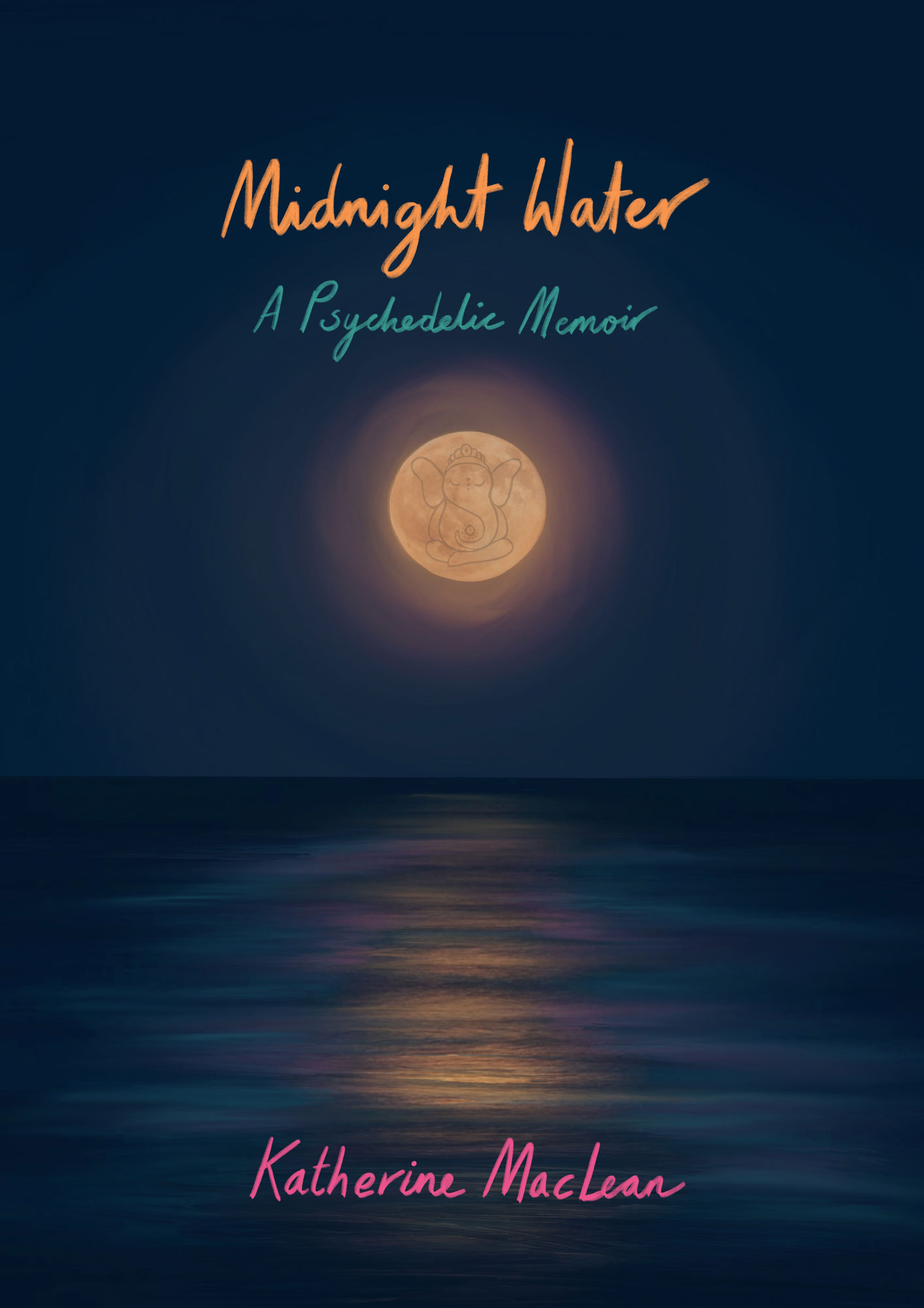
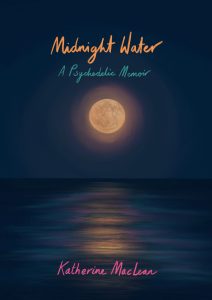
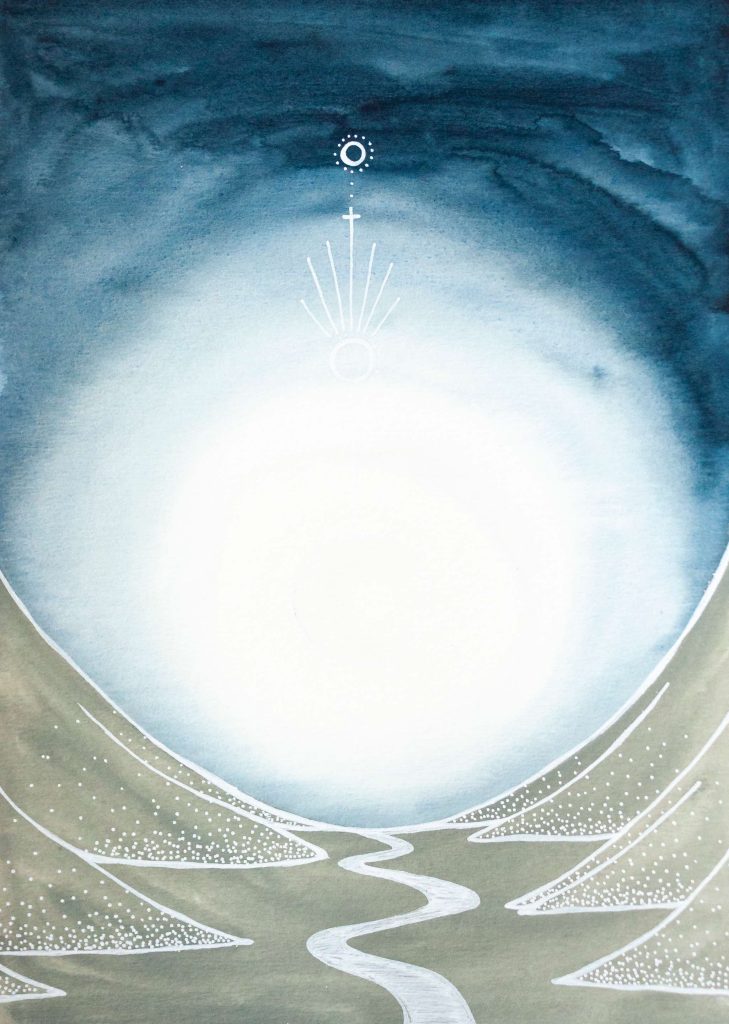
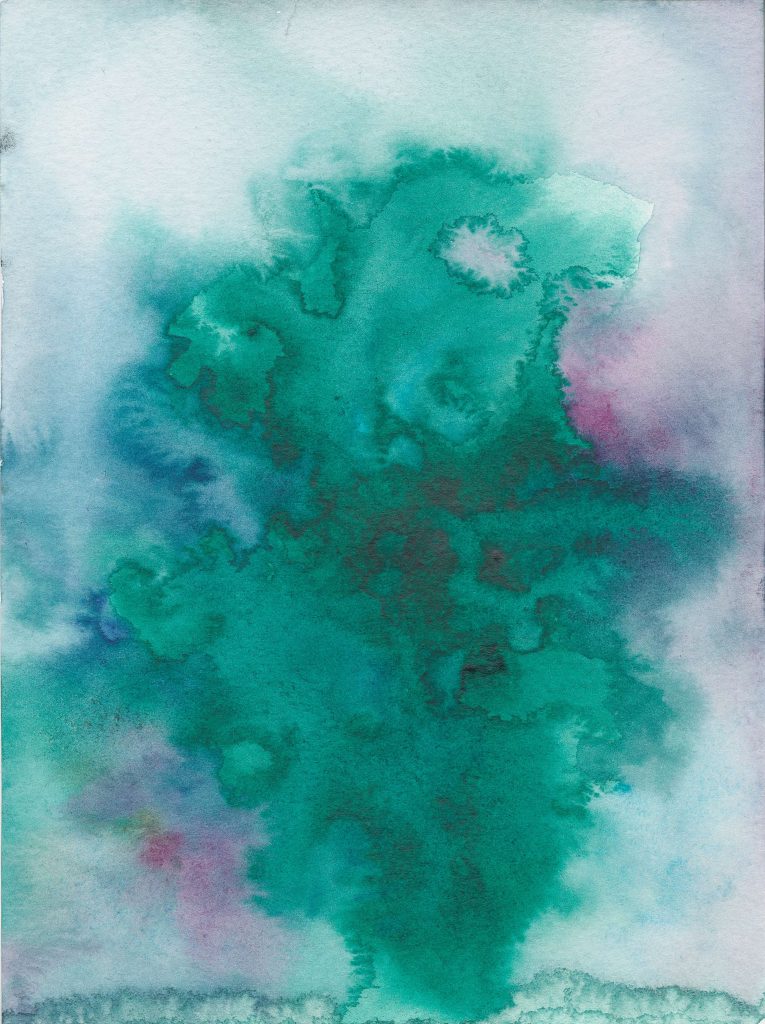
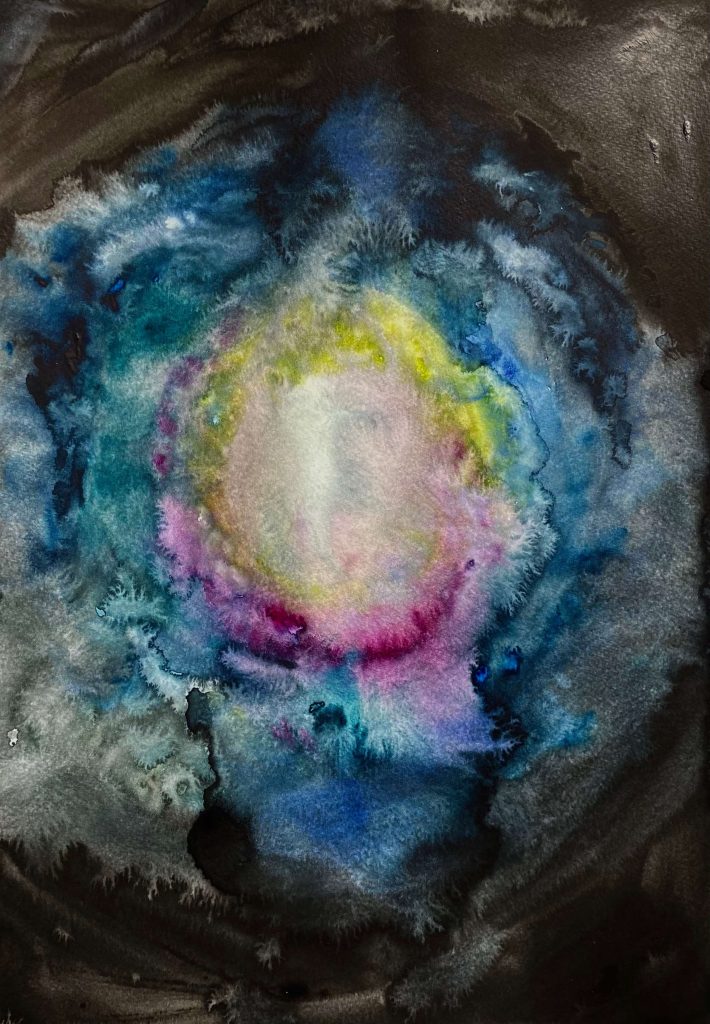
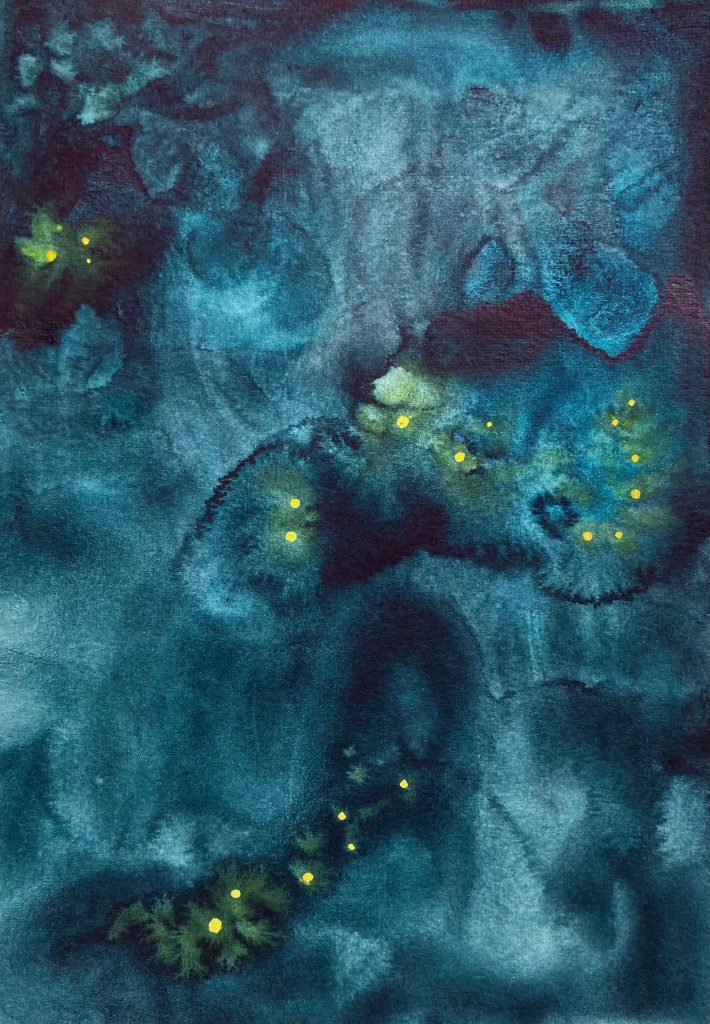
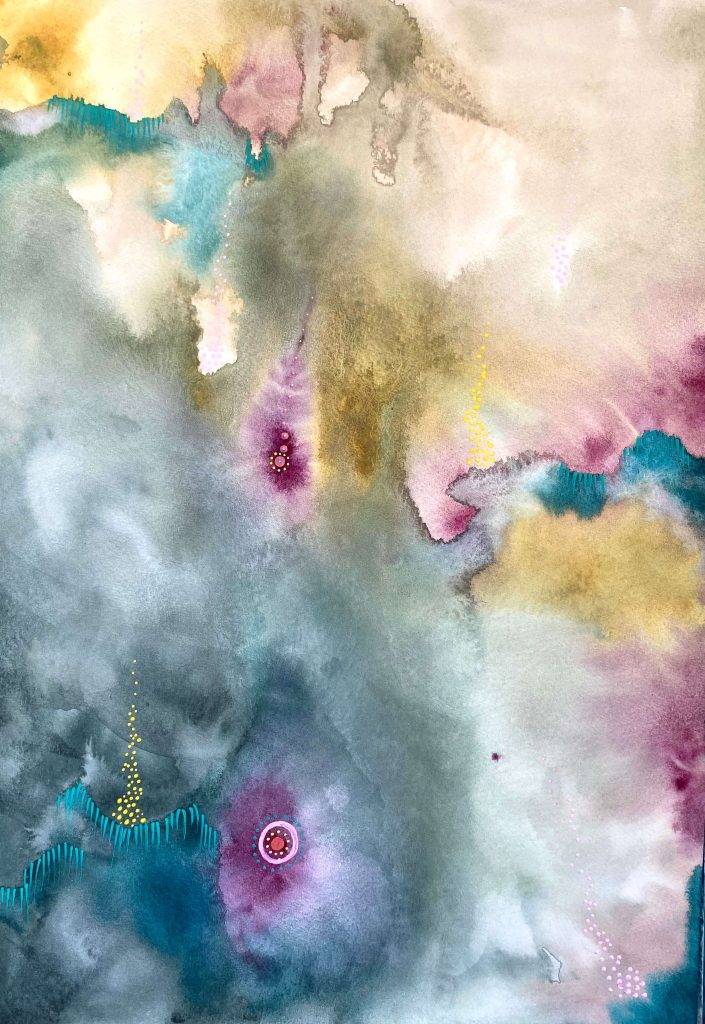

Interesting. Thanks for writing and thanks to Graham for showcasing. Here’s my question: How do you deal with the changed energy… from feelings of rage and hurt to the exhilaration of peace, love, and vitality?
Hi Andrew! For me, a switch from rage/hurt to peace/love is fairly easy… it feels like a burden being lifted, or like stepping out into cold fresh air after being stuck in a stuffy hot room with little oxygen. Breathing/being is simply easier and doesn’t require effort. I would say it’s much harder to re-experience the return of rage after being in a relative state of peace and love. I’m still working on that one. I think the key is self-compassion.
Wow!
I tingled I felt I thought I vibrated and most of all I cared !
So here I find myself on a quest for knowledge into all things lost and some might say my marbles..
Fixing yourself is a beautiful thing
Especially when it comes from deep within
I’ve a friend I will show this too in a hope it can explain better than i ever could
Thank you
So happy to hear you connected with the story and can share with your friend.
Katherine
Thanks for sharing!
lemon tek is the way to go … grind mushrooms (i use a blender) and soak in lemon juice for 15 minutes.
Then I blend in some ginger for the stomach and some fruit juice for the taste
“I don’t believe it’s possible to fix individuals with this medicine, despite what psychedelic psychotherapists claim. I have come to learn that mushrooms work at the level of connections and relationships—in the spaces between. They will do their work of weaving and connecting even where you don’t wish them to.”
I find that pretty interesting. What would fixing mean here?
Also, do you believe in the greater good of the psychedelic experience? That, maybe, some intelligences would know better than us the connections that we should or should not pay attention to in order to evolve…
I frankly respect all that is written here from a fellow psychonaut and I will surely buy your book. It is just that the way mushrooms are described in this perticular quote reminds me of some sort of… unconsiderate plague that just wants to spread using your mind, which is not really what I experienced.
The main interrogation here is about an intrinsic benevolance of the mushroom, what do you think about it?
Thank you Doc!